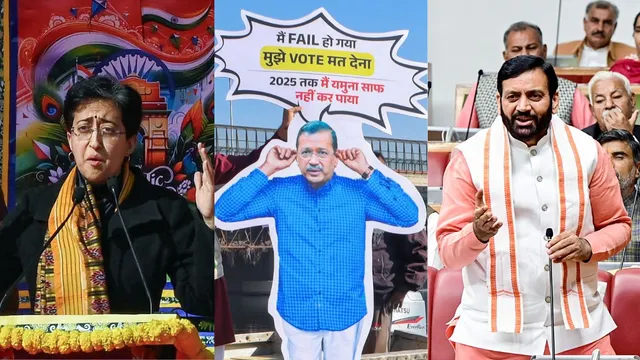- By Nidhi Giri
- Tue, 28 Jan 2025 05:44 PM (IST)
- Source:JND
Delhi Chief Minister Atishi on Tuesday met Chief Election Commissioner Rajiv Kumar regarding her complaint over the Yamuna Water issue, which sparked a war of words between the Haryana government and the Aam Aadmi Party. After meeting CEC Rajiv Kumar, Atishi said that she has apprised the poll body about the high-level of ammonia in Yamuna water released by Haryana to Delhi. Atishi alleged that the ammonia levels in Yamuna water have reached toxic levels, and if the situation persists, "the water treatment plants in Delhi will be forced to shut, significantly reducing the supply in several areas".
"We discussed the water issue in Delhi. We told the EC how the ammonia levels in Yamuna water coming from Haryana have reached toxic levels. If we continue to receive such contaminated water, many of our water treatment plants will be forced shut and 30% of Delhi will not receive any water. In the evening, Haryana CM Nayab Singh Saini will be coming to the Election Commission for a meeting with the CEC," Delhi CM Atishi said.
#WATCH | #DelhiElections2025 | On meeting the Chief Election Commissioner regarding the Yamuna water issue, Delhi CM Atishi says, "... We discussed the water issue in Delhi. We told the EC how the ammonia levels in Yamuna water coming from Haryana have reached toxic levels... If… pic.twitter.com/zM5HDtI6Al
— ANI (@ANI) January 28, 2025
The debate over the Yamuna's water quality has become a key political issue as Delhi gears up for the upcoming February 5 Assembly polls. AAP National Convenor Arvind Kejriwal on Monday alleged that Haryana was polluting the Yamuna’s raw water supply to Delhi. Kejriwal compared the alleged pollution to “biological warfare” and warned that it could potentially lead to mass casualties in the capital city.
READ MORE: Bengaluru Weather: City To See Rain From Jan 30 To Feb 2 | Check IMD 7-Day Forecast
"Atishi has again written a letter to the Election Commission today on the issue of water. The CEO of Delhi Jal Board confirmed yesterday that the water coming to Delhi is laced with a poison called ammonia. The Election Commission has given time to Bhagwant Mann and Atishi to meet at 4 pm today. Both will go. Saini Sahab (Haryana CM), don't do politics on water. Don't try to scare us that you will file a case. I will not let the people of Delhi die. Tell your party not to do dirty politics," Arvind Kejriwal said on Tuesday, as quoted by news agency ANI.
Haryana Chief Minister Refutes Accusations
Haryana Chief Minister Nayab Singh Saini on Monday countered Delhi AAP's claim that the ruling BJP in the state is "intentionally" draining industrial waste into the Yamuna. He demanded an apology and threatened legal action. Hitting back at the charges, Saini stated that the AAP government often points fingers at other states for its failure to address local issues.
Saini also took a jibe at Arvind Kejriwal, saying it has become his habit to level baseless allegations and blame others.
Delhi Jal Board Fact-Checks Kejriwal's Claims
In a formal letter to Delhi’s Chief Secretary Dharmendra, Shilpa Shinde, CEO of the Delhi Jal Board, clarified that such claims were harmful not only to public confidence but also to interstate relations between Delhi and Haryana. She termed the allegations as “factually incorrect, without basis, and misleading.” She requested the issue be referred to Lieutenant Governor VK Saxena.
Shinde’s letter emphasized that the water quality of the Yamuna fluctuates naturally during the winter months. Reduced water flow, combined with untreated sewage or industrial waste entering the river upstream, leads to an increase in ammonia levels.
The statement of former Chief Minister and present Chief Minister that the Haryana government has released “poison in the water ” is false, misleading, and factually incorrect. Such alarmist statements amount to fear mongering. Water in river Yamuna is of the same quality -1/2
— Delhi Jal Board (@DelhiJalBoard) January 27, 2025
Shinde assured that the Delhi Jal Board’s water treatment plants are fully equipped to handle ammonia concentrations up to 1 ppm and even higher levels, such as the 6.5 ppm currently being recorded.
The DJB's water treatment processes are designed to manage such conditions by diluting the river water with supplies from the Carrier Lined Channel and Delhi Sub-Branch.
While acknowledging that the untreated sewage upstream exacerbates the situation, Shinde mentioned that the Haryana government is taking steps to address the problem. Among these measures is the installation of new pipelines to meet the National Green Tribunal's directives, aimed at improving the water quality in the Yamuna and reducing pollution levels.

